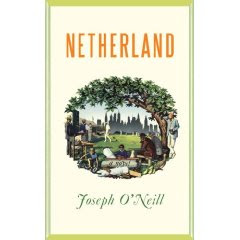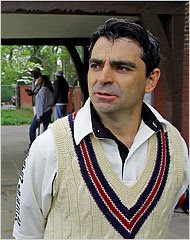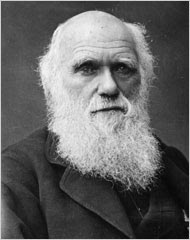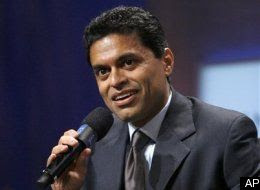 "Netherland": A Novel by Joseph O'Neill
"Netherland": A Novel by Joseph O'NeillGlancing through the May 26th issue of the New Yorker I came across James Wood's book review titled "Beyond a Boundary". What caught my attention was the accompanying photograph of men in white playing cricket under a bright blue sky with this tantalizing caption: "In Joseph O'Neill's "Netherland" cricket is at once an immigrant's imagined community, an emblem of foreignness, and, most poignantly, a dream of America." Intrigued, I quickly read Wood's review and felt an instant urge to head to a bookstore. Within days I had finished the novel and found that Wood's effusive characterization of the novel as "a large fictional achievement, and one of the most remarkable post-colonial books I have ever read" was indeed deserved.
James Wood is an English critic and has been a staff writer at The New Yorker since August 2007. It is hard to improve on Wood's excellent review of the novel which I would urge you to read (link above). It is easy to understand why he has been called "the best literary critic of his generation" and earned plaudits from even the most curmudgeonly of literary critics like Harold Bloom. Recently Wood has published a new work of criticism called "How Fiction Works" and two recent reviews by Delia Falconer in The Australian and Gideon Lewis-Kraus in the LA Times intelligently discuss Wood's influence and approach to criticism.
Right around the time Wood's review of "Netherland"was published there was a veritable flood of laudatory reviews and O'Neill profiles. New York Times had three different pieces within 3 days including a review by Michiko Kakutani, a Dwight Garner review in the Sunday Times Book Review and a profile of the author and the Staten Island Cricket Club where Joseph O'Neill plays his cricket. The Sunday Observer had back to back pieces by Will Buckley and Peter Beaumont and not to be left behind, Cricinfo Magazine published Andrew Miller's interview with the author. To top it all off, "Netherland" was just included on the longlist for this year's Man Booker prize and is favored to win by William Hill (a British bookmaker) with 7/2 odds. It is remarkable that fiction by a relatively little known author has received this kind of lavish attention but "Netherland" richly deserves it.

Instead of feebly reviewing a book that Wood has discussed with such flair let me talk instead of my quest to try to meet the author. I was so moved by the book and felt such a kinship with the narrator, Hans, that I wished I could meet the author and discuss the book with him. On searching the web to see if O'Neill was doing a book tour that would bring him to the San Francisco Bay Area I discovered that he was scheduled to be in Northern California just for one day on Tuesday, June 24th for two readings at bookstores almost an hour and half drive from where I live. One of the readings was scheduled at 5pm at the Orinda Bookstore in Orinda, CA not far from Berkeley. This was the closer of the two bookstores and never having heard of Orinda I carefully mapped out the directions and left work early on the 24th to meet O'Neill and to listen to him talk about his novel.
I also took three books with me that I wanted autographed. First, of course, I had my copy of "Netherland" with its copious marginalia. Second was O'Neill's book on his family history called "Blood-Dark Track" which traces the lives of his maternal and paternal grandfathers who were Turkish and Irish respectively. The last book in my pile was the 1993 Duke University Press edition of "Beyond a Boundary", CLR James' masterpiece about cricket, society, color and class in colonial Trinidad. With cricket as the backdrop and the incongruous relationship between the white, upper class Dutch narrator Hans and the dodgy, disarming, new world cricket entrepreneur Chuck Ramkissoon at the narrative center of the novel, "Netherland" is, in part, an homage to James' wonderful book. It is no accident that "Beyond a Boundary" is also the title of Wood's New Yorker review. What I also found interesting was that in 2007, Joseph O'Neill himself wrote a piece on "Beyond a Boundary" for powells.com which was surprisingly published on 9/11 which seemed to me quite a coincidence given that day's importance in the novel's setting. (When I told Joseph O'Neill about this he told me he had missed this fact and expressed genuine surprise at this weird coincidence).
I was the first to arrive for the reading at this small bookstore in Orinda and was welcomed by a woman from England who was the store manager (her interest in cricket prompted her to say yes to the publisher for a reading by the obscure O'Neill at her bookstore). Soon Joseph O'Neill arrived and I introduced myself. We chatted a bit about playing cricket in the US (he had played at Haverford's Cope field where I played for four years as an undergrad) and I effusively praised his book. We had a brief discussion about Wood's review and some aspects of the book and he was very friendly and indulgent.
The reading was brief but in the follow up Q&A the author said a few things that I found interesting. He mentioned that all through the long process of writing the novel he was certain from the very beginning that he had a perfect name for his book. It was going to be called "The Brooklyn Dream Game". However, when he had almost completed the novel his friend, the Irish poet Paul Muldoon, asked him if he had a name for the book. On hearing the intended title he asked if Joseph had also thought of an alternative. This gentle rebuke by a friend eventually led him to the present title which cleverly links many strands of the novel (the Dutch narrator, New York's old name "New Netherland" and 'nether' land meaning low land possibly implying ground zero).
After the reading I lined up to get my books signed and asked O'Neill to also autograph my copy of "Beyond a Boundary". He said he would be happy to do it and generously invited me to contact him if I was ever on the East Coast and wanted to play a game of cricket at the Walker Park with the Staten Island Cricket Club. I loved the wonderfully kind inscriptions that he wrote in my books. In "Netherland" he wrote : "To Fawad - Bat on boy, bat on" and in "Beyond a Boundary" it reads "With best wishes from a fellow man in whole".


 On Tuesday May 27th,
On Tuesday May 27th,